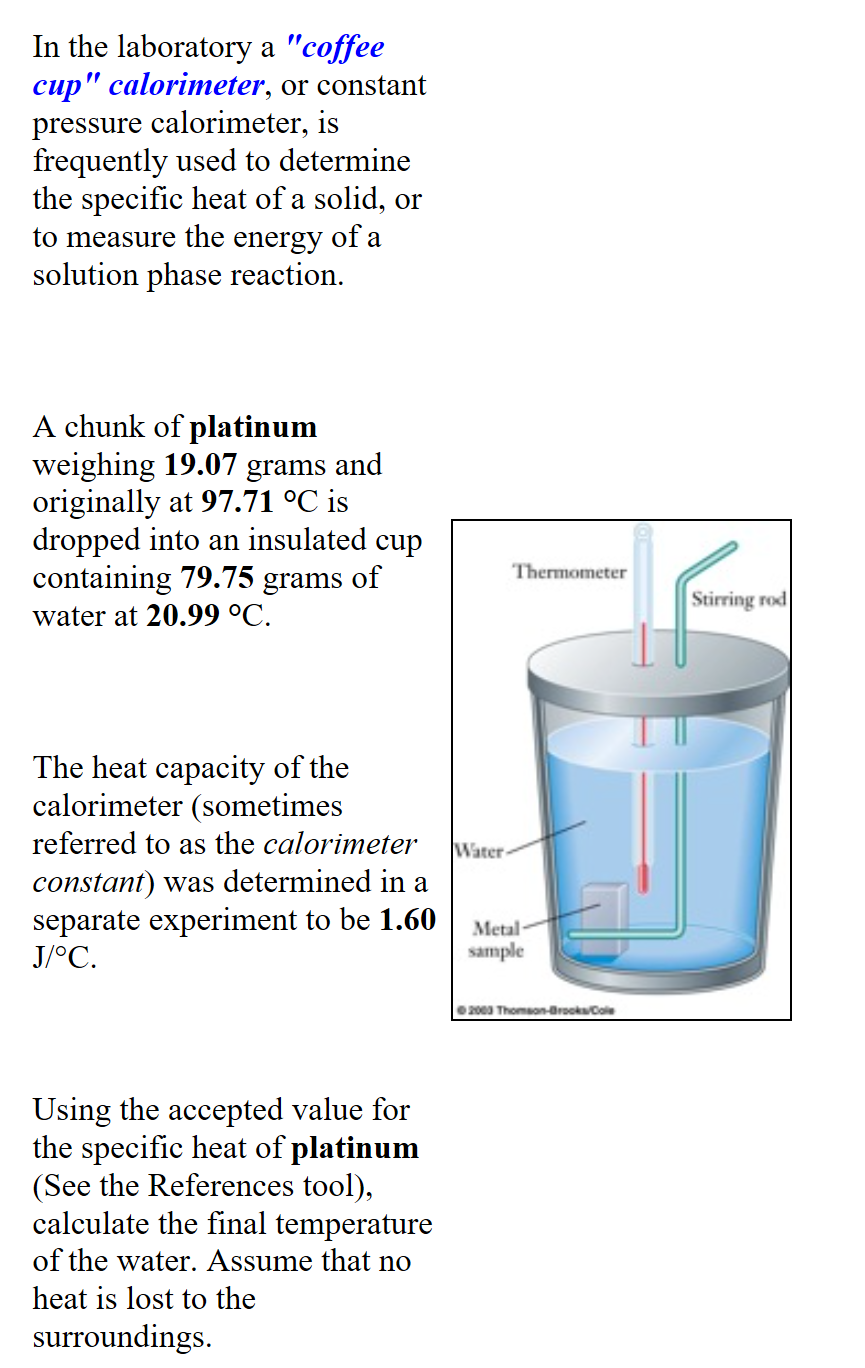In the laboratory a "coffee cup" calorimeter, or constant pressure calorimeter, is frequently used to determine the specific heat of a solid, or to measure the energy of a solution phase reaction. A chunk of platinum weighing 19.07 grams and originally at 97.71 °C is dropped into an insulated cup containing 79.75 grams of water at 20.99 °C Thermometer Stirring rod The heat capacity of the calorimeter (sometimes referred to as the calorimeter Water constant) was determined in a separate experiment to be 1.60 J/OC Metal sample e2003 Thomson-Brooks/Cols Using the accepted value for the specific heat of platinum (See the References tool) calculate the final temperature of the water. Assume that no heat is lost to the surroundings
In the laboratory a "coffee cup" calorimeter, or constant pressure calorimeter, is frequently used to determine the specific heat of a solid, or to measure the energy of a solution phase reaction. A chunk of platinum weighing 19.07 grams and originally at 97.71 °C is dropped into an insulated cup containing 79.75 grams of water at 20.99 °C Thermometer Stirring rod The heat capacity of the calorimeter (sometimes referred to as the calorimeter Water constant) was determined in a separate experiment to be 1.60 J/OC Metal sample e2003 Thomson-Brooks/Cols Using the accepted value for the specific heat of platinum (See the References tool) calculate the final temperature of the water. Assume that no heat is lost to the surroundings
Chemistry: An Atoms First Approach
2nd Edition
ISBN:9781305079243
Author:Steven S. Zumdahl, Susan A. Zumdahl
Publisher:Steven S. Zumdahl, Susan A. Zumdahl
Chapter7: Chemical Energy
Section: Chapter Questions
Problem 61E: A coffee-cup calorimeter initially contains 125 g water at 24.2C. Potassium bromide (10.5 g), also...
Related questions
Question

Transcribed Image Text:In the laboratory a "coffee
cup" calorimeter, or constant
pressure calorimeter, is
frequently used to determine
the specific heat of a solid, or
to measure the energy of a
solution phase reaction.
A chunk of platinum
weighing 19.07 grams and
originally at 97.71 °C is
dropped into an insulated cup
containing 79.75 grams of
water at 20.99 °C
Thermometer
Stirring rod
The heat capacity of the
calorimeter (sometimes
referred to as the calorimeter
Water
constant) was determined in a
separate experiment to be 1.60
J/OC
Metal
sample
e2003 Thomson-Brooks/Cols
Using the accepted value for
the specific heat of platinum
(See the References tool)
calculate the final temperature
of the water. Assume that no
heat is lost to the
surroundings
Expert Solution
This question has been solved!
Explore an expertly crafted, step-by-step solution for a thorough understanding of key concepts.
This is a popular solution!
Trending now
This is a popular solution!
Step by step
Solved in 4 steps with 2 images

Recommended textbooks for you

Chemistry: An Atoms First Approach
Chemistry
ISBN:
9781305079243
Author:
Steven S. Zumdahl, Susan A. Zumdahl
Publisher:
Cengage Learning

Chemistry: Principles and Practice
Chemistry
ISBN:
9780534420123
Author:
Daniel L. Reger, Scott R. Goode, David W. Ball, Edward Mercer
Publisher:
Cengage Learning

Chemistry for Engineering Students
Chemistry
ISBN:
9781337398909
Author:
Lawrence S. Brown, Tom Holme
Publisher:
Cengage Learning

Chemistry: An Atoms First Approach
Chemistry
ISBN:
9781305079243
Author:
Steven S. Zumdahl, Susan A. Zumdahl
Publisher:
Cengage Learning

Chemistry: Principles and Practice
Chemistry
ISBN:
9780534420123
Author:
Daniel L. Reger, Scott R. Goode, David W. Ball, Edward Mercer
Publisher:
Cengage Learning

Chemistry for Engineering Students
Chemistry
ISBN:
9781337398909
Author:
Lawrence S. Brown, Tom Holme
Publisher:
Cengage Learning

Chemistry: Principles and Reactions
Chemistry
ISBN:
9781305079373
Author:
William L. Masterton, Cecile N. Hurley
Publisher:
Cengage Learning

Principles of Modern Chemistry
Chemistry
ISBN:
9781305079113
Author:
David W. Oxtoby, H. Pat Gillis, Laurie J. Butler
Publisher:
Cengage Learning

Chemistry by OpenStax (2015-05-04)
Chemistry
ISBN:
9781938168390
Author:
Klaus Theopold, Richard H Langley, Paul Flowers, William R. Robinson, Mark Blaser
Publisher:
OpenStax